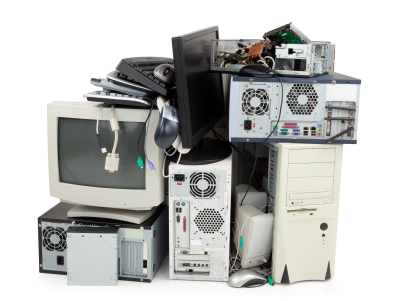I devoted a good portion of this cloudy, humid Sunday morning digging through the attic, collecting and boxing ancient electronics gear to take to the recycling center on Monday. Ancient, in these days of accelerating product releases, is anything more than about six years old. If you’re talking about cell phones or MP3 players, you can shorten the projected life span by another three years or so.
I write about computers and electronic gadgets for a living, so my attic probably isn’t representative of a typical American consumer, but I was still stunned by the magnitude of the pile of waste my efforts yielded. Keep in mind that I diligently work to keep gear operational and donate still functional equipment whenever possible. The local library has a station with one of my iMacs in use, the nearby art center is using a trusty Compaq from days past, and the public television station uses a digital audio tape deck I donated. I don’t dispose of anything if it’s not broken or I can find someone to make use of it. But, holy flaming mackerel fondue on a stale cracker, there was a godawful assortment of dead gear in my attic.
Are we setting ourselves up for the same kind of cyclical obsolence with the flood of e-readers elbowing each other for market attention? As ebooks proliferate and the e-reader wars continue (with projected sales of 6.6 million units this year), are we just producing another generation of short-lived devices bound for the contaminated recycling yards in China or India or is this actually a more sustainable approach to reading than physical books?
After my experience cleaning the attic, and literally feeling the weight of my consumptive habits, I’m probably going to resist buying any kind of electronic gadget any time soon. But as a side note to this recycling experience, I also hauled out several boxes of trade computer books, read recently only by mice who kindly left their little black footnotes in the margins. The technologies covered in these books are so completely out of date that they have no conceivable value, even in third-world countries where laptops are sometimes charged from car batteries.
Today, many computer hardware and software manuals are provided as PDFs. And, when you need a more in-depth, useful reference than what most companies provide in their frantic race to get a product released, there are online digital libraries, such as Safari Books Online, where you can read titles by top-notch authors and not have to worry about a physical book mouldering away in your attic after the information has gone the way of a mayfly.
Hopefully, the multiple ebook formats and the multitude of e-readers will eventually be pared down to something more reasonable for those of us who see ebooks as a more practical, sustainable way to gain information that has a finite life span without producing undue waste. And, instead of having 50 different models of competing e-reader (many doomed for early obsolesence) with a sizable number of ebook formats and protection schemes, we’ll have smartly designed, multi-purpose e-readers constructed without toxic materials and less environmental impact. There are tradeoffs both with traditional books and ebooks and their e-readers, as noted in this Greener Computing article, Why the Book Publishing Industry Hates the iPad:
If you order a book online and have it shipped 500 miles by air, that creates roughly the same pollution and waste as making the book in the first place. Driving five miles to the bookstore and back causes about 10 times the pollution and resource depletion as producing it. You’d need to drive to a store 300 miles away to create the equivalent in toxic impacts on health of making one e-reader — but you might do that and more if you drive to the mall every time you buy a new book.
The eco-footprint of book publishing can stand much improvement, both in the traditional venues and the evolving digital model. The next time I clean out my attic I hope there won’t be any discarded electronic gadgets there to recycle.





